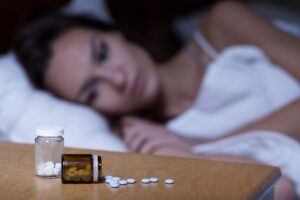 New research links sleeping pill use to Alzheimer’s risk in older adults. So if you’re using these sleep aids, you might want to keep reading.
New research links sleeping pill use to Alzheimer’s risk in older adults. So if you’re using these sleep aids, you might want to keep reading.
Although the study cannot prove that sleeping pills cause dementia, it does show a link that requires further exploration.
Advertisement
According to the researchers involved in the study, sleeping pills are one of the most commonly used medications among older adults, but their frequent use may not come without consequences.
The team found that participants reporting that they “often” or “almost always” took sleeping pills had a 79 percent higher risk of developing dementia compared to those who said they “never” or “rarely” used them.
Interestingly, the connection was only seen in white participants. There was no connection between sleeping pill use and dementia risk in Black participants. Roughly 60 percent of the participants were white, and about 40 percent were Black.
Researchers looked at about 3,000 seniors who shared their sleeping medication routines starting in 1997. There were between 70 and 79 years old none had dementia. They were asked about sleeping aid use three times over five years: never, rarely (once a month or less), sometimes (2-4 times per month), often (5-15 times per month), or almost always (more than 15 times).
Sleep aids included both over-the-counter (OTC) and prescription medications. OTCs included antihistamines, melatonin, and valerian. Prescription medications included antidepressants, antipsychotics, benzodiazepines, and zolpidem (Ambien).
Advertisement
Of course, the reason for the link needs to be examined much more closely. People who have worse sleep habits have a higher dementia risk, and taking sleeping pills indicates poor sleeping habits.
It’s also important to talk to your doctor if you are taking sleep aids. It is possible that they may interact with other medications you are taking.
Before looking to medications, try other ways to get better sleep. This could include visiting a sleep clinic to identify issues like sleep apnea or using lifestyle modifications to improve sleep hygiene.
